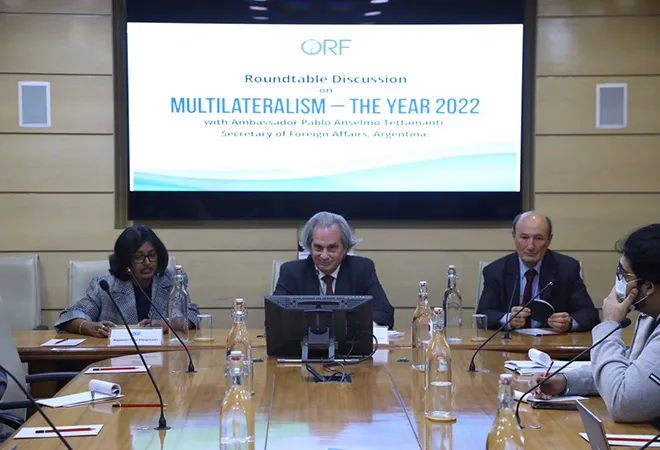On 18 September, 2021, Observer Research Foundation (ORF) organised a roundtable discussion on ‘Multilateralism - The Year 2022’, where Ambassador Pablo Anselmo Tettamanti, Secretary of Foreign Affairs, Argentina put forward his views on the topic and answered several questions posed to him by the participants of the discussion. He began the discussion by stating that multilateralism is currently in crisis. The COVID-19 induced pandemic has only highlighted the same. No country was clear as to where their problems could be addressed in a timely manner. For example, Argentina currently has almost 50 percent unemployment rate amongst the youth, but it does not know which organisation it should take up the issue with.
The first reason for the same is that the present multilateral system was created post World War II (WWII), when only 54 countries were signatories of the UN, whereas now, there are 193 member countries. This new reality needs a new system of multilateralism as the present one is outdated. Secondly, immediately after WW II, the Cold War commenced in which the whole world was involved in the tension between the US and the Soviet Union, resulting in regional disputes and tensions brewing behind the scenes. It is only now that the world is coming face-to-face with the effects of the Cold War as new regional disputes and tensions are on the rise again. This was not foreseen by the makers of the current multilateral system. They based the concept of multilateralism on three fundamental elements of the world economy—labour, capital, and finance—all three of which were supposed to bring peace and security in the world order. However, the Cold War changed the vision of the world system in a way which was not foreseen by the framers of the system.
Thirdly, with the advent of the new world order, forums such as Non-Alignment Movement (NAM) and North-South Dialogue have lost steam and relevance. Several multilateral forums in Latin America have become redundant as the whole of the continent lives in relative peace and harmony, and have friendly relations with all their neighbours. Hence such forums have faded into the background. This is probably only a phase and not a sign of a crises. Fourthly, important bodies such as the Security Council have not been very productive in resolving disputes in the recent past. Even the World Trade Organisation that was supposed to be an intermediary between the interests of the corporates and labourers, has become a forum for extraneous discussions.
Lastly, the entry of private entities in the world order and questions pertaining to taxing Big tech companies or regulating Bitcoin have posed new challenges for countries. Such challenges cannot be adequately addressed in the present world order, as the multilateral system was formed with the idea of governments solving disputes amongst themselves. The entry of private entities and such was not foreseen before.
On the possibility of a middle power alliance, Ambassador Tettanmanti stated that Argentina is itself a middle country and all middle countries need to work together to maintain a multilateral order which is beneficial to all countries, not just the powerful ones. He also stated that poor and small countries do not have much say in the formation of the global order, therefore it was up to countries like India and Argentina to work together and help form the new world order. Additionally, most countries were forced to choose a side during the Cold War, which was detrimental to their own national interest but were not left with much choice. We need to work together so that the same does not happen in the near future due to a power struggle between USA and China. On the need for new leadership, it was emphasised that we cannot rely on any other country for leadership as all powerful countries look after their own interest. Therefore, middle-sized countries need to take initiative and establish a new leadership under which the voices of smaller countries are heard and addressed.
The global multilateral system is in crisis, and if the things are not changed, the crisis could have long-lasting repercussions on peace, security, rule of law, and global governance. It is in the interest of all countries, including Argentina and India, to work together and reinforce their commitment towards strengthening and reforming multilateralism.
The views expressed above belong to the author(s). ORF research and analyses now available on Telegram! Click here to access our curated content — blogs, longforms and interviews.




 PREV
PREV

